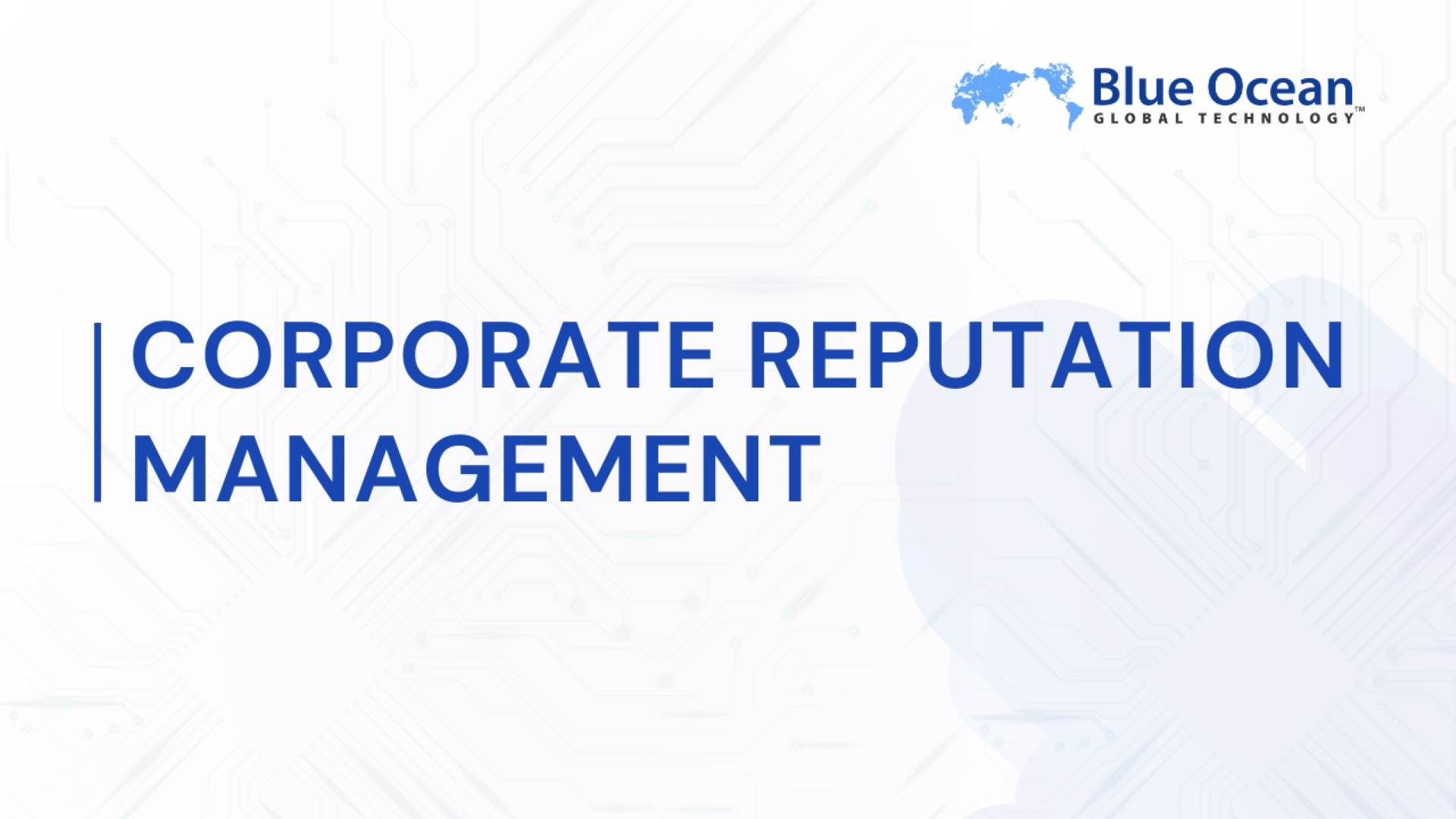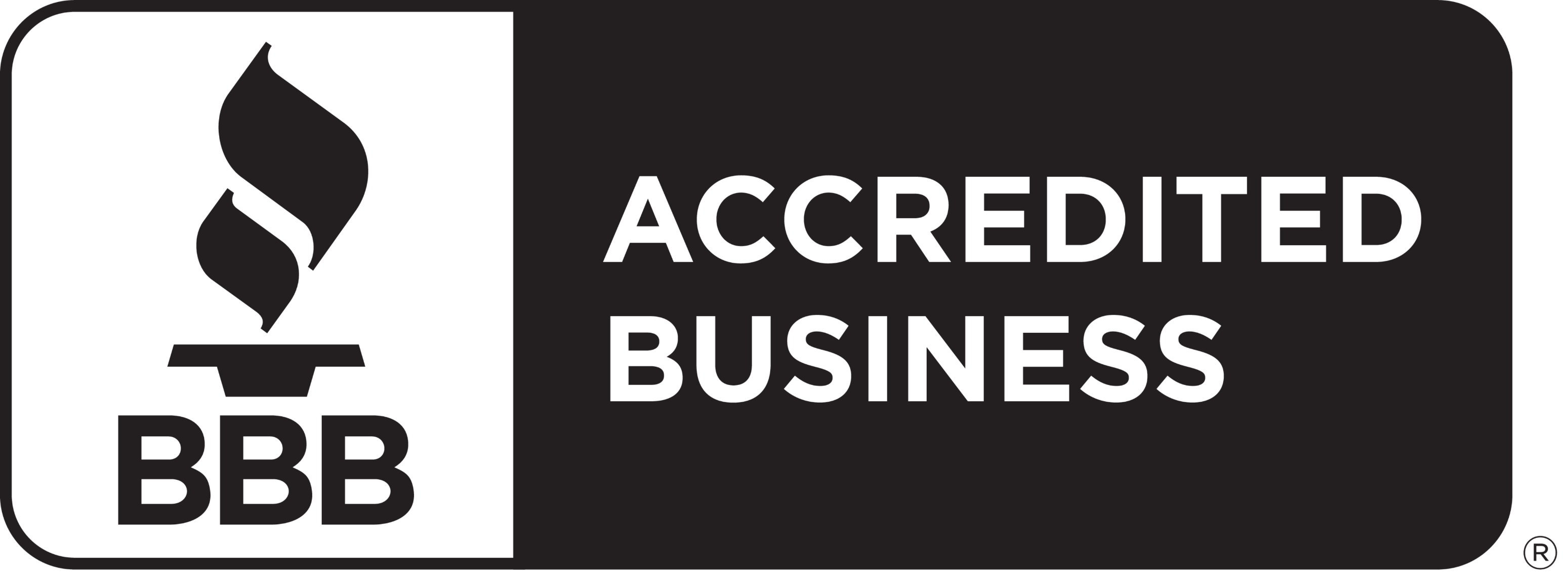Effective corporate reputation management is a crucial element for sustaining stakeholder trust, navigating crises, and securing a competitive position in today’s dynamic business environment. Many organizations fail to prioritize this intangible asset, despite its direct impact on financial performance, public perception, and long-term success.
This guide lays out the essentials of corporate reputation management, focusing on why reputation matters, techniques for maintaining it, and tools available to strengthen your brand. Blue Ocean Global Technology provides expert services to protect and enhance corporate reputation, empowering businesses to adapt and thrive in an interconnected world.
What is Corporate Reputation Management?
Corporate reputation management refers to the deliberate strategies and practices employed to maintain and improve a company’s public image, stakeholder trust, and overall perception. It ensures that organizations remain resilient in the face of potential challenges by actively shaping how they are viewed by the public, customers, and employees.
Corporate reputation management involves activities like monitoring public sentiment, addressing negative feedback, and fostering stakeholder relationships. It functions as both a defensive and proactive measure, shielding a company from reputational damage while creating opportunities for growth and goodwill.
Why Does Corporate Reputation Matter?
A positive reputation acts as a cornerstone for building trust and loyalty among customers, investors, and employees. It influences purchasing decisions, attracts talent, and strengthens partnerships. Organizations with strong reputations often outperform their competitors in market share and profitability.
What is the Reputation of a Company?
A company’s reputation represents how it is perceived by its audience, influenced by factors such as product quality, customer service, corporate values, and crisis response. It determines whether a business is seen as trustworthy, ethical, and reliable, directly impacting its ability to succeed in competitive markets.
Why is Corporate Reputation Important?
A strong corporate reputation transcends immediate business outcomes, forming the foundation for long-term success. It enhances trust, supports crisis recovery, boosts customer loyalty, and improves employee retention.
Corporate reputation shapes a company’s ability to maintain relationships, attract customers, and access critical resources. Its importance is further underscored by its role in enhancing revenue, mitigating risk, and ensuring organizational sustainability.

How Corporate Reputation Impacts Success
Public perception significantly impacts a company’s financial performance. Organizations with favorable reputations experience increased customer loyalty, greater profitability, and stronger brand equity. Conversely, reputational damage often correlates with lost opportunities and declining market value.
Stakeholder Trust
Stakeholder trust, built through transparent communication and consistent action, is the bedrock of corporate success. When stakeholders perceive a company as ethical and dependable, they are more likely to invest time, resources, and loyalty, contributing to its growth.
Crisis Resilience
A robust reputation acts as a shield during crises, enabling businesses to recover more efficiently. Companies with existing goodwill and trust can manage controversies, cybersecurity incidents, or public criticism without suffering irreversible harm.
Key Strategies for Corporate Reputation Management
Effectively managing corporate reputation involves a series of proactive and responsive measures designed to maintain a favorable public image and recover from potential setbacks.
How Do You Manage Corporate Reputation?
Managing corporate reputation begins with establishing clear objectives, identifying key stakeholders, and implementing systems to monitor feedback. Consistent evaluation and adaptation ensure that companies can address emerging challenges efficiently.
Monitoring Online Sentiment
Businesses can use tools like Brandwatch or Google Alerts to track mentions, reviews, and trends that reflect public perception. According to a 2024 industry analysis from the Digital Reputation Institute, companies employing sentiment monitoring tools report a 45% improvement in identifying risks early.
Strategic Communication
Clarity and consistency in messaging are essential for maintaining a positive image. Whether engaging with customers, vendors, or media outlets, strategic communication reflects an organization’s values and mitigates misinformation.

Crisis Management Strategies
Handling crises effectively requires swift action, honest communication, and pre-established contingency plans. A clear crisis response minimizes reputational damage and restores trust.
Stakeholder Engagement
Maintaining open dialogue with key stakeholders, including employees, customers, and investors, fosters mutual understanding and loyalty. Direct engagement ensures that stakeholders feel valued and heard.
Tools and Best Practices for Corporate Reputation Management
Implementing reputation management strategies is streamlined by leveraging specialized tools and adhering to proven best practices, creating a structure for sustainable reputation building.
What are the Main Tasks of Corporate Reputation Management?
Day-to-day tasks include tracking online sentiment, resolving customer complaints, highlighting positive reviews, and ensuring alignment between corporate actions and promised values.
Tools for Corporate Reputation Management
Reputation tools bolster an organization’s ability to monitor and respond to public sentiment:
- Social media monitoring tools like Hootsuite or Sprout Social help track real-time conversations and public feedback on major platforms.
- Customer review platforms such as Trustpilot and Google Reviews allow companies to collect, respond to, and analyze client feedback.
- Analytics dashboards provide insights into how reputation efforts translate into measurable outcomes.
Corporate Reputation Management Best Practices
Companies looking to protect their reputation online benefit most from strategies that are rooted in transparency and consistency.:
- Actively engage with customers through social media to build positive relationships.
- Transparently address negative feedback to demonstrate accountability.
- Highlight successful outcomes and satisfied customers through testimonials.
How to Improve Corporate Reputation
Organizations can refine their reputation over time by prioritizing customer experiences, maintaining ethical practices, and aligning corporate identity with stakeholder expectations. A 2023 study by Global Business Insights found that proactive communication led to a 50% stronger correlation between positive perception and revenue growth.
Corporate Reputation Management Case Examples
Examples of successful reputation management underscore the value of these strategies in real-world settings.
What are Examples of Corporate Reputation Management Programs?
Organizations that monitor sentiment, engage stakeholders, and manage crises have achieved substantial reputational gains. For instance, companies that employ structured review systems to address feedback often see an improvement in customer loyalty.
Real-World Reputation Recovery
Well-executed reputation recovery can transform public opinion. For instance, companies facing data breaches that transparently communicate efforts to enhance security often regain trust faster than those that remain silent.
Measuring Corporate Reputation Impact
Metrics such as customer sentiment scores, online review averages, and stakeholder engagement levels highlight the success of reputation management programs and their role in driving tangible results.
Protect Your Company’s Reputation Today
Don’t allow unfavorable news to damage your reputation. Our team of experts will protect your company’s image and instill trust in your customers.
Other Key Considerations in Corporate Reputation Management
Corporate reputation is also influenced by factors such as regulatory compliance, measurable ROI, and corporate identity, emphasizing the need for a holistic approach.
Legal and Regulatory Considerations
Compliance with local and international standards ensures that organizations avoid regulatory penalties while maintaining ethical business practices.
ROI of Reputation Management
Quantifying the ROI of reputation programs involves analyzing increased revenue, higher stakeholder engagement, and reduced regulatory risk. Businesses with strong reputations recover faster from crises and often garner premium valuations in the market.
Talent Attraction and Retention
Reputation plays a critical role in talent management, as prospective employees prefer organizations with ethical practices and positive work cultures. This dynamic contributes to improved recruitment outcomes and reduced turnover.
The Role of Corporate Identity
A company’s identity, defined by its mission, values, and operational decisions, directly shapes its reputation. Aligning identity with public expectations strengthens credibility and trust.
In an increasingly interconnected business landscape, corporate reputation is an indispensable asset that directly affects an organization’s success. Proactive reputation management fosters stakeholder trust, mitigates risks, and ensures sustainable growth. Blue Ocean Global Technology takes pride in providing expert solutions to help organizations protect, promote, and evolve their corporate reputations.
Frequently Asked Questions
1. How does Social Media Impact Corporate Reputation?
Social media provides a platform for public feedback, reviews, and discussions. Positive interactions in social media can enhance a company’s image. Negative comments or viral posts can quickly damage its reputation. Effective social media management and monitoring are crucial for a positive online reputation.
2. When Should a Company Seek Professional Help for Reputation Management?
A company should consider professional help for corporate reputation management if it faces ongoing negative publicity. Also, if it lacks resources or expertise to manage its reputation effectively, or needs specialized support. Professional ORM services can provide strategies, advanced tools, and dedicated expertise to protect and enhance the company’s image.
3. What is the Difference Between Brand Reputation and Corporate Reputation?
Brand reputation relates solely to the image customers have of a company’s offerings. Corporate reputation relates to the overall impression that the public has towards the firm. It includes its values, ethics, and business practices.
Take Control of Your Online Presence
Your company’s reputation is your most precious asset. Let us help you protect and improve it. Our custom strategies leave a lasting positive impact on your brand.














Comments are closed.